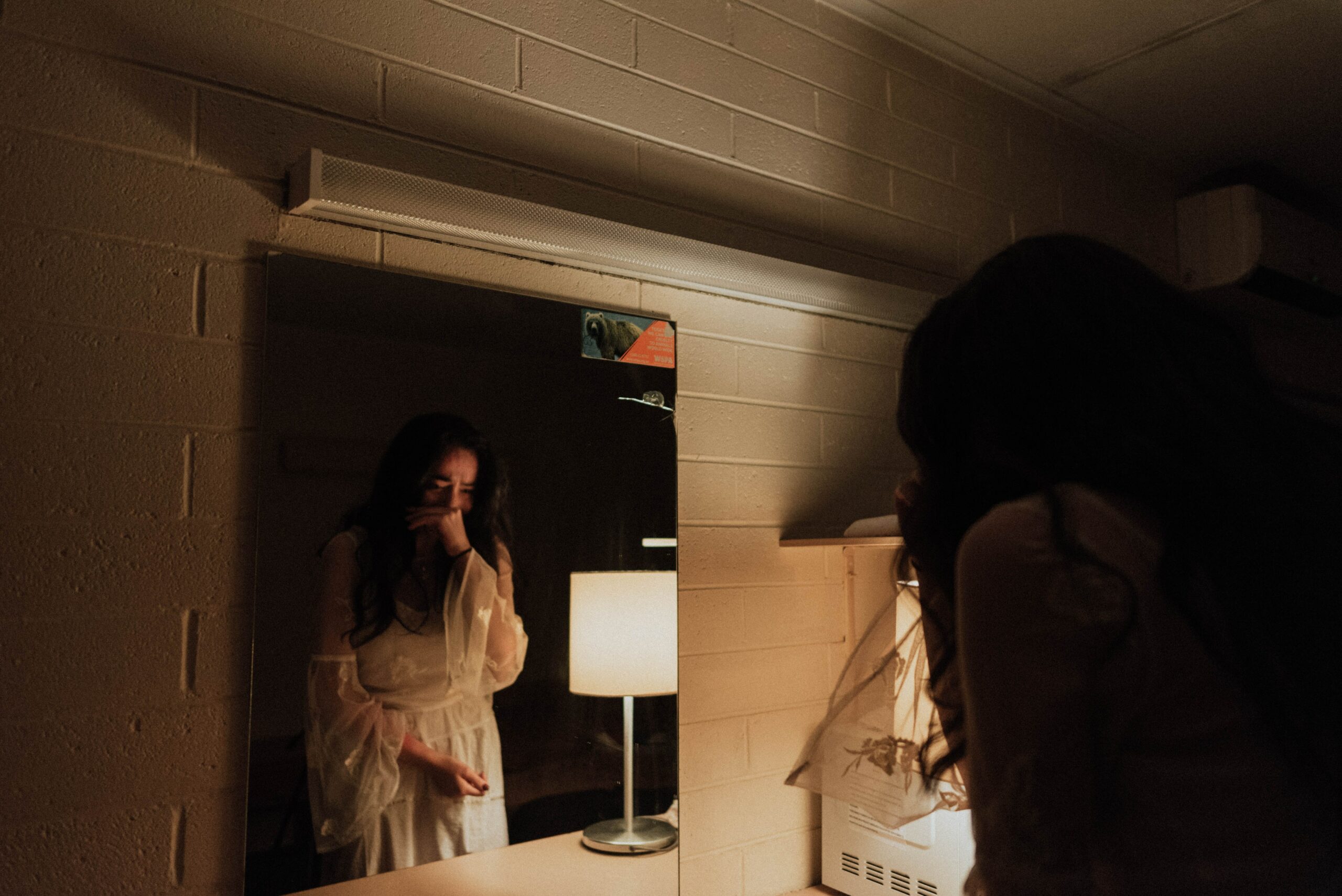Have you ever wondered why the mere act of chatting about how you feel can end up in a full-blown tear fest? Let’s be real, shedding a tear or two (or many) when we open up is something many of us go through.
You may cry when talking about your feelings because you are looking for a way to connect with another person, you need cathartic release, or your soul might be yearning for authenticity!
If you’ve realised you’re highly emotional, you may be asking yourself “Why Do I Cry When I Talk about My Feelings?!” Where is it coming from and is this normal?!”
Listen – I’m a pro crier. I cry when I’m happy, sad, stressed, angry, excited. I’ve come to accept that this is just who I am and how I process things. If you ask me how I am feeling – really feeling – I’ll most likely cry when talking about it.
Read below to find out more about why you may be getting emotional when discussing (and expressing) your feelings.
Psychological Perspective
1. We’ve Been Crying Since Forever
At its core, crying is an evolved form of communication. Before language, our ancestors had to communicate somehow, right? ✨ Enter tears.✨
Our ancestors relied on non-verbal cues to signal distress or the need for community support. These tears, glistening signals of vulnerability, played a vital role in the communal nature of humans, evoking empathy and urging support from the tribe.
If someone asks how you are doing or how you have been feeling, and you begin talking about your true feelings, you maybe (un)consciously cry because you are looking for a way to connect with the other person.
Through crying and expressing our true feelings, we may be seeking empathy, understanding, and support from others.
2. Cathartic Release
You know that feeling of finally uncorking a bottle that’s been shaken up? That’s our heart sometimes. Many of us, knowingly or unknowingly, bottle up our emotions.
Over time, tiny frustrations, sadness, or joys we didn’t express build up pressure. And then, when we finally find a safe space to talk, it’s like popping the cork.
In discussing these pent-up feelings, tears serve as a cathartic release valve, allowing us to process, confront, and cleanse these accumulated emotions.
Perhaps we struggle to truly feel our emotions and understand how we feel. It’s only when someone else asks us “Hey, how are you doing?” that we may finally stop and check-in with ourselves. Then, a cathartic release in a form of crying appears.
This is very often what would happen to me. I’ve struggled with acknowledging + facing my emotions. I would keep myself busy and productive, never wanting to have a moment for my own self. I was scared of the feelings that would bubble up.
Then, whenever I had a change to chat with a friend or a family member, and the topic of “How I’m feeling” would come up, I would break down in tears.
You can’t outrun yourself! If the pressure of your emotions keeps building up, at some point the cork will have to pop.
3. Emotional Conditioning and Personal History
Our emotional responses, especially when it comes to sharing our feelings, are deeply entwined with the tapestry of our past experiences.
It’s like every emotion has a backstory, and it’s important to understand that these backstories can significantly influence how we express ourselves in the present.
Our childhood is the foundational phase where we learn the language of emotions. How caregivers respond to our feelings sets a blueprint for our emotional expression in adulthood. If a child is consoled and understood when they cry, they learn that expressing emotion is safe and accepted.
Conversely, if they are scolded or dismissed, they might learn to associate emotional expression with negative outcomes. These learned responses don’t just vanish as we grow up; they solidify and influence how comfortably (or hesitantly) we navigate our emotional landscapes as adults.
Beyond personal experiences, the culture and society we grow up in can also play a role in shaping our emotional responses. Some cultures laud stoicism and see emotional restraint as a sign of strength.
Others might encourage free emotional expression as a natural and healthy way of being. As we absorb these societal norms, they too become a part of our emotional DNA, subtly guiding how we react when our feelings are stirred.
Ask yourself: Who do you cry in-front when talking about your feelings? Is it just in front of a good friend or family member? Is it mostly with people you barely know? These insights have a lot to offer.
At one point in my life I found myself crying & expressing myself truly with people that barely knew me. I think in a way I felt more comfortable to show my true emotions in front of people who barely knew me, because the “stakes were lower”.
It somehow felt easier to cry in front of an acquaintance instead of a close friend. I guess I was scared of being truly see by the people that knew me most.

Spiritual Perspective
4. The Energetic Nature of Emotions
Delving into spiritual interpretations, emotions aren’t just biochemical reactions; they carry energy. Adherents of Eastern philosophies often reference the chakras or energy centers of the body.
Discussing deep-seated feelings can stir these chakras, particularly the heart and throat, leading to emotional releases, often in the form of tears.
The heart chakra, associated with love, compassion, and our emotional connections, and the throat chakra, linked to communication and expression, are especially sensitive to emotional fluctuations.
When we dive into profound conversations or confront suppressed feelings, these chakras can get activated, vibrating intensely with the stirred energy. This sudden surge can become overwhelming, seeking a release, and tears often become the conduit for this overflow of energy.
In essence, when we cry while delving into our feelings, it’s not just a psychological response; it’s an energetic release. It’s our body’s way of balancing and recalibrating its energy, ensuring that we don’t remain inundated with pent-up emotions.
These tears, from an energetic viewpoint, can be seen as a harmonizing force, restoring equilibrium to our inner energetic landscape.
5. Soul’s Yearning For Authenticity
Our souls, according to many spiritual teachings, yearn for truth and authenticity. When we suppress our genuine feelings, it causes spiritual discord. Conversely, expressing these feelings, even with tears, brings us closer to our higher self, our truest form.
At the heart of our being, beneath the layers of societal expectations, ego-driven pursuits, and external noise, lies the core essence of who we are—our soul.
This innermost part of us, according to numerous spiritual philosophies, constantly seeks alignment with truth, desiring to resonate with authenticity in every beat. In a world rife with masks and facades, our souls can often feel stifled, nudging us in subtle and sometimes profound ways to seek genuine expression.
Suppressing our authentic feelings can be akin to placing a weight on the chest of our spiritual selves. This weight, over time, creates a disharmony, a kind of spiritual restlessness.
When we finally find the courage or the moment to unveil and share those suppressed emotions, it’s like allowing our souls to breathe freely again. The accompanying tears aren’t just a release of pent-up emotions; they’re drops of authenticity, a testament to the soul’s liberation from the shackles of pretense.
This act of revealing our true emotions, crying and all, isn’t just about emotional relief. It’s a spiritual homecoming.
Every tear shed in authenticity is a step closer to our higher self, a gentle reminder of our inherent need to live, speak, and feel our truths. In this light, tears become more than just salt and water; they’re liquid expressions of a soul finding its rightful, authentic path.
It’s okay to cry
I hope that these 5 points bring some insight and clarity. Whether you resonate with only the psychological perspective, or also the spiritual perspective, remember that no matter how you express your feelings – it’s okay and it’s normal!
If you’d like to do some self-reflection and inner researching (as I like to call it!), consider checking out my online class “Journaling for Self-Reflection”. Additionally, this article about books for emotional regulation might be a great resource for you as well!
